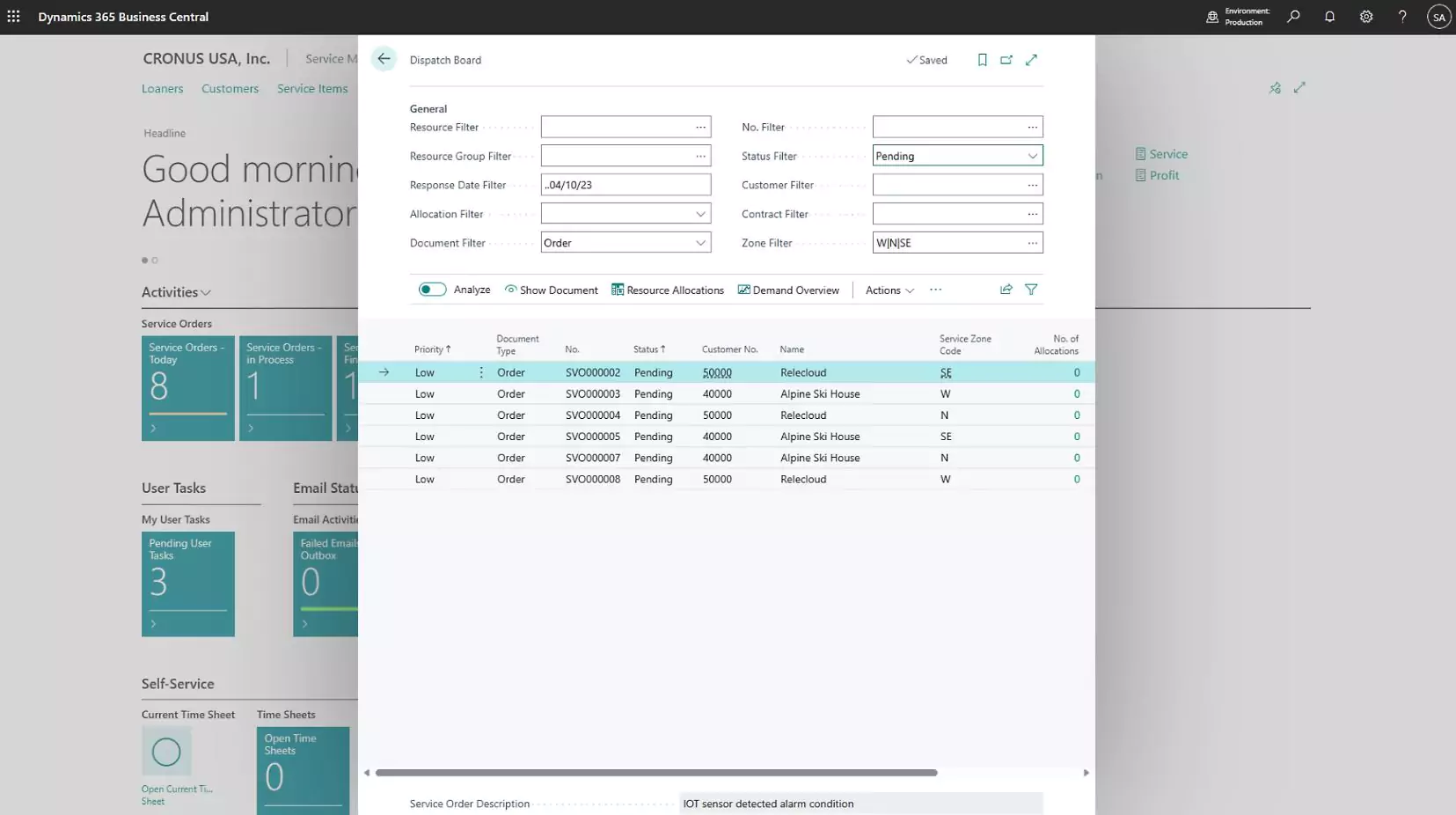What is Business Central Service Management?

Dynamics 365 Business Central’s Service Management module is a solution for companies that provide after-sales service, maintenance, or repairs. This module gives service-based businesses the tools to plan, track, and execute service operations. In this blog, we’ll explore what Business Central Service Management is, its capabilities, and how you can get started.
What is Dynamics 365 Business Central Service Management?
Dynamics 365 Business Central is an ERP solution available in two editions: Essentials and Premium. The Service Management module is included only in the Premium edition of Business Central. The Premium edition adds advanced capabilities for Manufacturing and Service Management that are not available in the Essentials edition. To learn more about the differences, read our blog, Business Central Essentials vs Premium.
Business Central Service Management is designed for companies that provide services to customers, such as equipment maintenance, repair services, or other field service operations. It extends Business Central’s core functionality to help manage after-sales service processes within the ERP system. With Service Management, you can create and track service orders, assign technicians to work orders, schedule dispatches, and manage service agreements and warranties, ensuring that every service call is handled efficiently and billed accurately.
The Service Management module acts as a centralized hub for all service-related activities. Instead of relying on separate tools or manual tracking for service jobs, everything can be managed directly in Business Central. This includes logging customer service requests, setting up recurring maintenance schedules, managing parts and labor for repairs, and even invoicing customers for service work. Business Central can also integrate with Dynamics 365 Field Service for advanced field technician dispatch and scheduling capabilities, helping maintain a seamless flow of information between your ERP and field service operations.
Benefits of Dynamics 365 Business Central Service Management
The Service Management module adds capabilities that streamline your service processes, reduce operational overhead, and improve customer satisfaction. Whether you manage service contracts, field technicians, or warranty claims, Business Central can simplify your workflows and make your team more responsive.
- Streamlined service operations: The module helps automate and organize service processes, reducing manual effort. Tasks like creating service orders, dispatching technicians, and managing service schedules are handled in a structured way, which minimizes errors and speeds up response times.
- Improved customer satisfaction: With faster response times and more reliable service delivery, businesses can meet and even exceed customer expectations. Service teams have the tools to address customer issues quickly, maintain service level agreements, and communicate effectively.
- Optimized resource utilization: The system enables smarter allocation of service resources. Managers can assign the right technicians to the right jobs based on skills and availability, and ensure needed spare parts are on hand for each task. This optimization reduces downtime and avoids unnecessary trips, boosting productivity and cost-effectiveness.
- Unified data and processes: Because Service Management is embedded within Business Central, all service activities tie directly into your core business data. There’s no need for separate systems or duplicate data entry. This integration means you have a single source of truth for operations and finance, improving accuracy and cross-department collaboration.
- Data-driven insights and improvement: All service transactions and customer interactions are recorded in Business Central, allowing for rich reporting and analysis. Managers can track key performance indicators like response times, number of service calls completed, costs of service, and customer feedback.

Want to see Business Central Service Management in action?
If you’re interested in seeing how Dynamics 365 Business Central Service Management could work for your business, our team at Rand Group can help. We offer personalized demonstrations to show how the module’s features address your specific needs and challenges.
What are the capabilities included in Business Central Service Management?
Business Central’s Service Management module offers a set of features that empower companies to manage every aspect of their service operations. Below are some of the key features included in the module:
- Service order management: Create, manage, and track service orders for customer repair requests or routine maintenance. You can log post-sale issues, initiate service requests, and keep a complete history of each service order, including quotes, order status, and the work performed.
- Service contract management: Define and maintain service agreements with your customers. This feature lets you record contract details such as coverage periods, response times, service level agreements (SLAs), and any special pricing or discounts. You can track contract history, automate renewals, and manage warranties on service items or spare parts.
- Service item & parts management: Keep detailed records of the service items or equipment your company services. For each item (or piece of equipment), you can maintain information like serial numbers, warranty status, BOM (bill of materials) components, and service history. This makes it easy to see all past work done on an item and any components replaced, which is crucial for complex equipment maintenance and warranty claims.
- Service price management: Configure flexible pricing for your services and maintenance work. With service price management, you can set up price groups based on criteria. The system can automatically apply the correct pricing or discount structure to service orders that meet those criteria. You can define standard costs for labor, parts, and other charges, set minimum or maximum fees for certain jobs, and review statistics to make sure your service operations remain profitable.
- Service planning and dispatching: Assign personnel to work orders and schedule technicians for on-site visits or repairs. Dispatchers can filter available service technicians by skill set, availability, or location and assign the right people to the right jobs. The system provides an overview of all active service tasks, their priority, and the workload of your team, helping you balance tasks and respond to escalations effectively.
What’s the difference between Business Central Service Management and D365 Field Service?
Dynamics 365 Business Central’s Service Management module and Dynamics 365 Field Service are both designed to manage service operations, but they differ significantly in scope and focus. While both solutions manage service operations, Dynamics 365 Business Central’s Service Management module is best suited for basic, ERP-integrated service needs like work orders, contracts, and after-sales support. In contrast, Dynamics 365 Field Service is a CRM-based application built specifically for businesses that rely on field technicians. It offers advanced scheduling, dispatching, and mobile tools that support high-volume, technician-driven operations.
D365 Field Service provides robust resource scheduling and time-tracking out of the box, along with features like AI-driven scheduling, IoT-based alerts, and remote assistance support, advanced functionality that Business Central’s Service Management module doesn’t include natively. Business Central Service Management covers the fundamentals of service orders, contracts, and resource assignment within a financial system, while Dynamics 365 Field Service offers a more specialized toolkit for managing a mobile workforce and customer-centric service delivery.
When to choose Dynamics 365 Field Service:
- You dispatch field technicians daily and need to optimize schedules, routes, and skill matching for efficiency
- Technicians require a robust mobile app with offline access to view work orders, capture service details, and update status on the go
- Your service model includes preventive or contract-based maintenance and IoT-connected equipment that can trigger service calls automatically
- You want to provide customers with self-service scheduling, real-time notifications, or a customer portal for service requests and status updates
Implement Dynamics 365 with Rand Group
Successfully leveraging service management software requires not just the right application, but also the right expertise. Rand Group is a certified Microsoft partner with extensive experience in both Business Central and Field Service implementations. We help organizations determine the best software for their business and then help with implementation and support. Our end-to-end services around Dynamics 365 include:
- Software evaluation and selection: Not sure if Business Central Service Management meets your needs, or if Dynamics 365 Field Service is a better fit? We help you evaluate your service requirements and guide you in choosing the right solution, whether that’s the Premium edition of Business Central, D365 Field Service, or both.
- Implementation and setup: Our team follows best practices to implement Business Central Service Management smoothly. From initial planning and system configuration to migrating your service data and training your staff, we work to deliver a successful rollout that addresses your service operation needs.
- Integration: Whether you need to add Dynamics 365 Field Service for more advanced scheduling and dispatching, or connect Business Central with your broader technology stack—such as CRM, customer portals, or third-party service tools—we design and implement seamless integrations that keep your data and operations connected.
- Customization and development: We can tailor Business Central by developing custom extensions or configurations for the Service Management module, such as specialized reports, custom workflows, or additional fields to capture data that’s critical to your operations.
- Ongoing support and training: After implementation, our support team is available to assist with any challenges, from troubleshooting issues to performing system upgrades. We also work with you to continuously improve and adapt your Business Central solution as your business grows or service processes change, supporting long-term success.
Next steps
The Business Central Service Management module gives service-based organizations the tools they need to streamline operations, respond faster to customer needs, and maintain full visibility over service contracts, equipment, and performance. If your business handles service orders, repairs, or maintenance agreements, upgrading to the Premium edition of Business Central with Service Management is a strategic investment.
Ready to modernize your service operations? Contact Rand Group to schedule a demo and explore how Business Central Service Management can support you.




